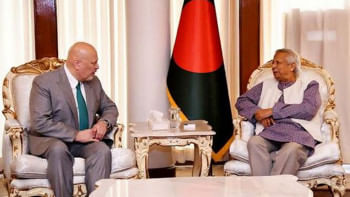The Mahmudullah question

The body language of any sports team on the field is a good indicator of where the side stands mentally and from the beginning of the recently concluded World Cup, Bangladesh side have painted a picture of falling heads and dropping shoulders. Coming into the T20I series at home against Pakistan, the crisis appears to have deepened with captain Mahmudullah Riyad unable to facilitate the mental changes that are basic in the modern game.
A dramatic last over from the skipper, where he bagged three wickets, had added some spark to the dead rubber in the third T20I against Pakistan at the Sher-e-Bangla yesterday but the game in reality was well over before that point as the Tigers ended up succumbing to their first T20 series whitewash at home since 2018 against Sri Lanka. The last time that it happened was also under Mahmudullah's leadership and not much change has come in the attitude or acceptance of such difficult situations.
Yesterday's last over saw Mahmudullah marshalling his troops with more vigour than had been seen in the series so far, imbued by the two wickets of Sarfaraz Ahmed and Haider Ali off back-to-back deliveries. However, Mahmudullah's involvement on the field, when the team has found itself in difficult situations, has been puzzling since the series wins against Australia and New Zealand at home. It is easier to lead when there is momentum but team leaders need to galvanise others when the chips are down.
"Yeah, it's a little heartbreaking. We got close but unfortunately it didn't happen for us," Mahmudullah dictated with a dejected smile following the match yesterday.
When asked about Saif Hassan being dropped from the third T20I, his response reminded of how he dealt with the Mushfiqur Rahim question: "The team management will be able to answer it well."
Mahmudullah, since the beginning of the Pakistan T20 series, has worn the expression of a man forced to carry a burden that he does not agree with. The vacant smile, answering media questions vaguely only because he has to answer for the sake of answering, were noticeable. When he refers to team management, the obvious question would be whether he is part of that management as the skipper. Whether or not he agrees with the selection, as the on-field captain, it was his duty to uplift players lacking confidence but his own submission has made things difficult. That he was not accountable on selection matters was made clear.
However, accountability has to be there. Even against sides like Scotland and Oman at the World Cup, the team's body language was one of despair at crunch times and Mahmudullah himself looked the most disheartened.
"If we could win one or two matches, the confidence level would be higher. The dressing room was spirited during Australia and New Zealand series. Obviously when you lose, it creates doubt. The boys tried hard," the skipper said regarding where his side is at the moment.
A side cannot however always have winning momentum, but the lack of involvement and positive body language that results in a defeatist mentality is more damaging than losses. At this rate, would it be unfair to ask whether Mahmudullah sees himself carrying on as captain in the long-term? If he does, does it correlate with the team finding a new way in T20s?


 For all latest news, follow The Daily Star's Google News channel.
For all latest news, follow The Daily Star's Google News channel. 



Comments